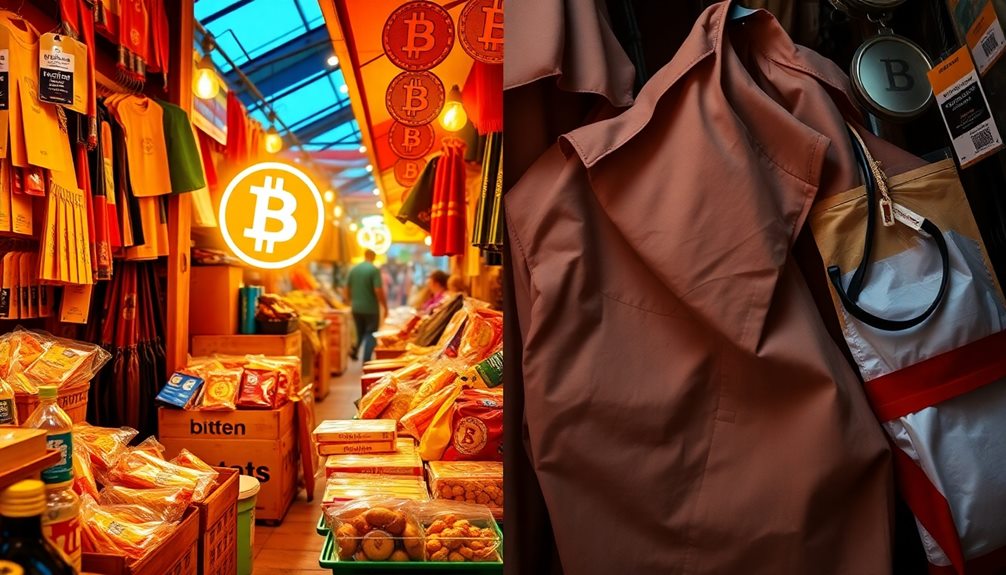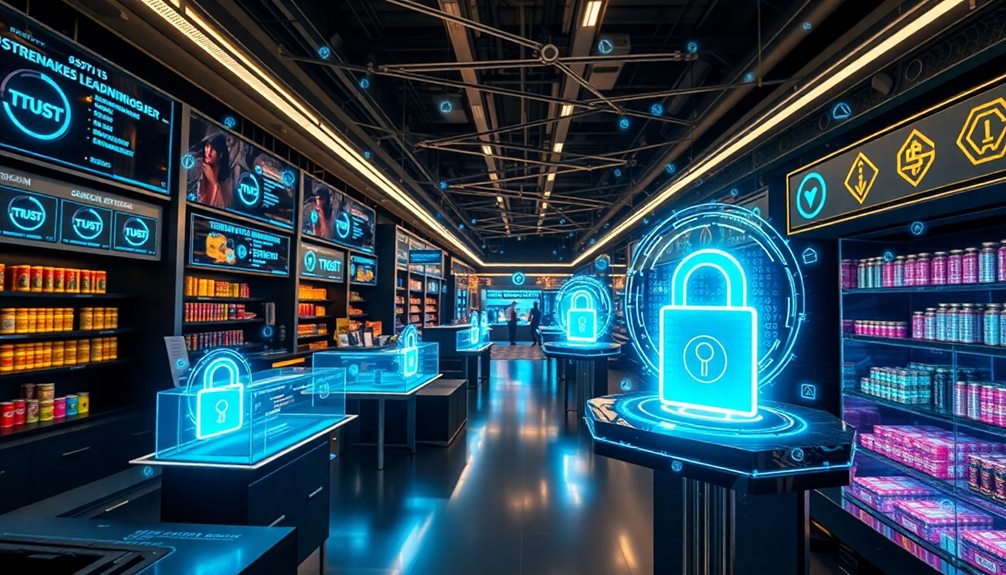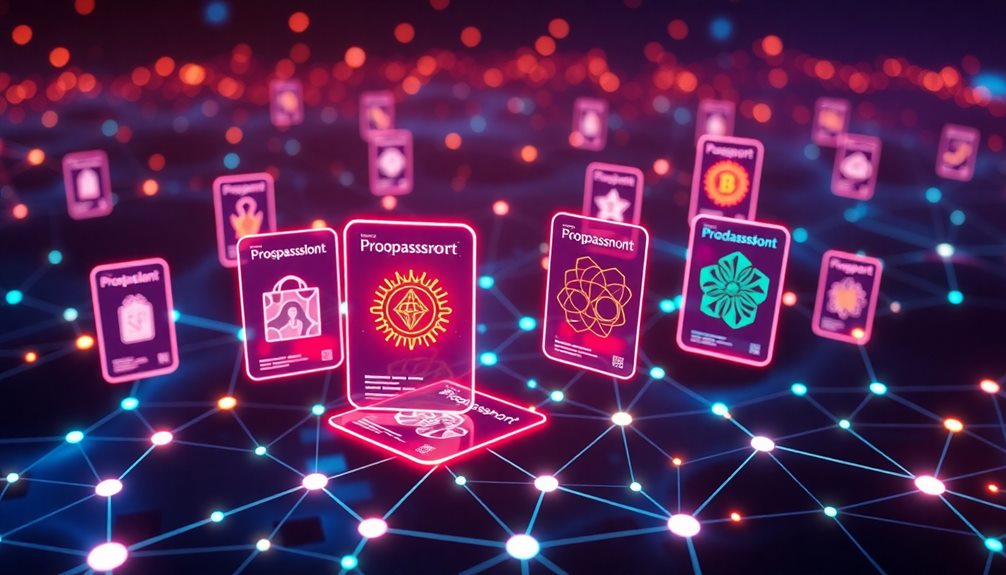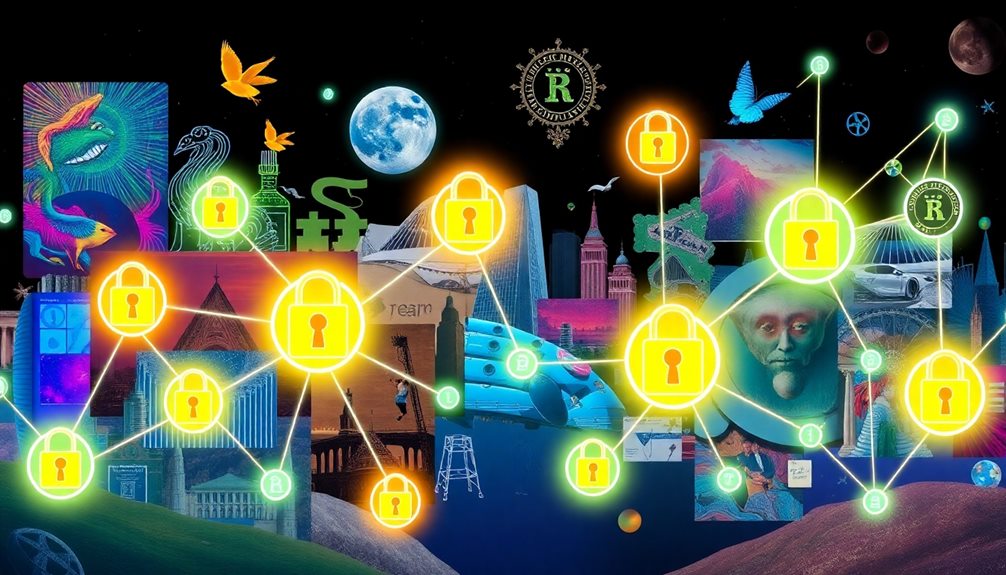Blockchain-verified digital products give you peace of mind in an era filled with counterfeit goods. They provide a transparent and secure way to confirm authenticity through Digital Product Passports (DPPs), which track a product's journey from creation to sale. You can easily access product details using NFC chips or QR codes, ensuring that what you buy is genuine. This technology resonates particularly with Gen Z consumers, who prioritize verified authenticity. By adopting these blockchain solutions, brands enhance trust and loyalty among their customers. Keep exploring to discover more about how this technology is transforming product integrity.
Key Takeaways
- Blockchain technology provides a tamper-proof record of digital products, ensuring authenticity throughout their lifecycle.
- Digital Product Passports (DPPs) utilize NFC chips or QR codes for easy access to verified product information.
- Immutable proof offered by blockchain enhances consumer trust, particularly among Gen Z seeking authenticity in products.
- Continuous monitoring via blockchain increases supply chain integrity and reduces the risk of counterfeit goods.
- Brands leveraging digital credentials can foster deeper loyalty and trust with consumers in a competitive market.
Rise of Counterfeit Goods

In recent years, the rise of counterfeit goods has become a pressing issue for consumers and brands alike. With US Customs and Border Patrol seizing over $1.5 billion in fake products in 2023, it's clear that distinguishing genuine items from counterfeit ones is increasingly challenging.
You may find yourself questioning the authenticity of both luxury and everyday products, which can lead to frustration and uncertainty. The emergence of blockchain technology offers a promising solution for verifying product authenticity, making it easier to trace the origin and ownership of items.
As counterfeit goods proliferate across various sectors, the demand for reliable product verification has surged. Consumers like you need effective methods to ascertain that what you're buying is genuine.
This is where digital credentials and blockchain technology come into play. By providing transparent and tamper-proof product information, these technologies enhance authentication processes, ensuring that you can trust the items you purchase.
Moreover, the use of blockchain for verification not only bolsters data security but also reinforces consumer trust, which is essential for brand integrity.
As industries adopt these innovations, the hope is to combat the counterfeit crisis, giving you greater confidence in your purchases and a more secure shopping experience.
Blockchain Solutions Against Fraud

The rise of counterfeit goods has sparked a growing urgency for effective fraud prevention solutions, pushing industries to explore innovative technologies. Blockchain technology stands out as a powerful tool in this fight, offering a seamless verification process that enhances product authenticity and security measures. By leveraging public blockchains, companies can provide consumers with transparent access to product information, helping to dispel any claims about a person or product's legitimacy.
Here's a quick comparison of traditional methods versus blockchain solutions:
| Traditional Methods | Blockchain Solutions |
|---|---|
| Limited transparency | Full transparency via public blockchains |
| Manual verification processes | Automated, tamper-proof verification |
| Difficulty in tracing provenance | Instant access to product lifecycle data |
Digital Product Passports (DPPs) are leading this innovation, enabling detailed tracking of a product's journey from creation to sale. The Aura Blockchain Consortium is setting standards in the luxury sector, employing NFC chips or QR codes for easy access to authenticity data. For consumers, especially Gen Z, knowing a product's authenticity is vital, making blockchain a game-changer in the fight against fraud.
Digital Product Passports Explained

Digital Product Passports (DPPs) revolutionize how you interact with products by providing a detailed and tamper-proof record of their lifecycle. Leveraging blockchain technology, DPPs enhance transparency and trust in various industries, guaranteeing that the data you access is accurate and reliable.
With features like NFC chips or QR codes, you can easily retrieve information about a product's sourcing, materials, and even its end-of-life disposal. This innovation not only aligns with the growing demand for accountability in product sourcing but also complements the increasing emphasis on ethical considerations in AI technology to guarantee responsible practices.
These passports play a vital role in promoting sustainable practices, supporting circular economy initiatives, and increasing consumer awareness. When you scan a QR code, you're not just seeing a product; you're verifying its digital identity through Verifiable Credentials, which validate its authenticity without compromising your personal information.
DPPs also facilitate seamless verification requests across the supply chain, allowing for continuous monitoring and auditing. By collaborating with various stakeholders, the integration of DPPs guarantees that accurate data is maintained, making your purchasing decisions more informed and trustworthy.
As you prioritize authenticity in your purchases, DPPs align perfectly with your values, empowering you to make choices that reflect your commitment to sustainability and integrity.
Gen Z's Demand for Authenticity

Amid a landscape filled with counterfeit products and misleading claims, Gen Z consumers are demanding authenticity like never before. A staggering 92% prioritize verified product authenticity in their purchasing decisions, driving brands to adopt transparent practices. The rise in counterfeit goods, highlighted by US Customs seizing over $1.5 billion in 2023, has only intensified this demand.
Blockchain technology stands out as a solution, providing a secure way to verify product authenticity through immutable data storage and decentralized identifiers (DIDs). For Gen Z, digital identity is vital, and brands that issue digital credentials can greatly enhance trust and loyalty. By leveraging blockchain and Digital Product Passports (DPPs), companies can effectively engage this discerning demographic.
Here's a quick breakdown of Gen Z's authenticity demands:
| Key Demand | Importance | Blockchain Benefit |
|---|---|---|
| Verified Authenticity | 92% prioritize it | Immutable proof |
| Security | Protect against counterfeits | Data integrity |
| Digital Identity | Essential for trust | DIDs for transparency |
| Enhanced Loyalty | Brands must earn trust | Digital credentials issued |
Meeting these demands is vital for capturing and retaining Gen Z consumers in today's market.
Blockchain's Impact on Various Industries

Blockchain technology is reshaping industries by providing transparent tracking of product lifecycles, which is essential in today's market. This innovative approach not only enhances authenticity but also drastically reduces counterfeiting—just look at the $1.5 billion worth of counterfeit goods seized in 2023.
As a result, businesses are increasingly recognizing the importance of integrating blockchain's decentralized nature to improve their operational efficiency and security. By implementing blockchain, you can improve your brand's credibility and foster trust with consumers.
Here are some compelling use cases:
- Digital Product Passport (DPP): Issuing digital credentials via blockchain establishes a new standard for luxury products, verifying authenticity and ownership.
- Agriculture Transparency: Blockchain enables consumers to trace products like coffee beans, enhancing quality assurance and informed purchasing decisions.
- Gen Z Engagement: With 92% of Gen Z valuing verified product information, utilizing decentralized identifiers (DIDs) can strengthen your digital identity and appeal to this demographic.
This technology offers a decentralized solution that eliminates the need for third parties, ensuring data integrity through the secure use of private keys.
Frequently Asked Questions
What Does Blockchain Verified Mean?
When something's blockchain verified, it means you can trust its authenticity and ownership. The digital ledger records transactions securely, making it nearly impossible to alter or counterfeit, giving you confidence in what you're buying.
What Is a Blockchain Verified Certificate?
A blockchain verified certificate's your assurance of authenticity. It uses decentralized technology, making it tamper-proof and instantly verifiable. This means employers can trust your credentials without lengthy, costly background checks or intermediaries.
What Is Digital Identity Verification in Blockchain?
Digital identity verification in blockchain empowers you to control your personal data securely. You manage your identity using cryptographic keys, ensuring only you access it, all while reducing risks associated with centralized databases and data breaches.
What Records Can Be Verified by Blockchain?
You can verify ownership transfers, certificates of authenticity, and supply chain data using blockchain. It guarantees transparency and trust, making it easier for you to make informed decisions and avoid counterfeits in your purchases.
Conclusion
In a world where counterfeit goods spread like wildfire, blockchain-verified digital products stand as a robust shield against fraud. By embracing digital product passports, you're not just ensuring authenticity; you're meeting Gen Z's growing demand for genuine experiences. As various industries harness blockchain's potential, it's clear that this technology is transforming how we value and verify digital creations. With blockchain, you're not just buying a product; you're investing in trust that's as solid as a rock.









